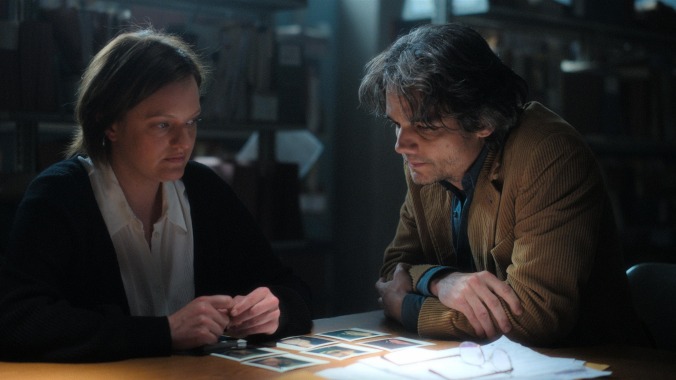Shining Girls' Wagner Moura on playing a good journalist (and a bad drunk)
As he returns to television, the Narcos star picks apart his new role in Apple TV Plus' metaphysical thriller

Good news: Brazilian actor Wagner Moura is back on the small screen for the first time since his fantastic run on Narcos. In the ’90s-set metaphysical thriller Shining Girls, which debuts with three episodes on April 29 on Apple TV+, Moura plays Dan Velazquez, an intense Chicago Sun-Times reporter in the midst of a career crisis.
A single father with alcohol problems, Dan struggles to retain control of his once-popular column and finds respite in tracking a difficult crime story with newspaper archivist Kirby Mazrachi (Elisabeth Moss). That tricky assignment leads them to a serial killer, Harper (Jamie Bell), who can seemingly travel through time (and left Kirby for dead six years ago). Dan’s imminent bond with Kirby stems from his own inner trauma that Shining Girls unpacks with each episode.
Moura has more than two decades of experience in the industry, including in the Brazilian action films Elite Squad and Elysium, and the American biopic, Sergio. His international claim to fame came with through the aforementioned Narcos, in which he played drug kingpin Pablo Escobar for two seasons and earned two Golden Globe nominations. The A.V. Club spoke to Moura about why journalism matters, the things that drew him to Shining Girls, and what, if anything, he can tease about where the show is headed.
The A.V. Club: Shining Girls is your first series regular role since your time with Narcos ended in 2016. What convinced you to play Dan Velazquez?
Wagner Moura: So many things, honestly. I think the writing was great. [Series creator] Silka Luisa managed to balance a mix of genres, which is difficult to achieve. It’s a crime story with science-fiction. At its core, it’s about femicide, which is something that resonates with me personally. I was so excited to be playing a journalist. That’s my own background. I graduated and worked as one for quite a while in my career early on. I also think this is a very important time to be portraying a good journalist on TV. Journalism is in such a weird position nowadays because of fake news. Most people get their information from social media. World leaders are discrediting the work of journalists, which is a dangerous thing. I was proud to be playing a good albeit troubled reporter. Dan is a guy who takes his craft seriously.
AVC: Obviously I agree with everything you just said about journalism. And Dan’s role as a reporter factors hugely into how he helps out Kirby. Alongside your own real experiences, what kind of research did you do as you dove into the role?
WM: Most of my friends in Brazil are journalists; they were my university colleagues. I reached out to them to talk about the differences between what it’s like to work in the field now versus in the ’90s. It’s obviously very different. I read various books about the industry. Mainly, I reached out to this amazing writer from The Chicago Sun-Times, Robert Herguth, who is one of those investigative journalists that work on two to three investigative stories per year. He was so generous with his time; he took me to the newsroom, which was extremely exciting and informative for me.
AVC: Dan and Kirby develop an instant friendship, and he doesn’t dismiss her truth or her story either. Why do you think they’re able to connect over this case?
WM: My personal favorite part of the show is Dan and Kirby’s relationship. It’s beautifully written. They’re two people with similar wounds and scars; they’re just trying to get their life back on track. They recognize that in each other. That doesn’t mean they open up to each other right away. It will happen at a slow pace over season one. For Dan, the beginning bond with Kirby is about the story and bringing his professional life back. Here’s a guy who had his own column, and he wants to regain that. But then, after he gets to know Kirby, it will get more personal. He wants justice for her, to help catch Harper and stop him from killing more women. I think it’s a great arc for Dan.
AVC: In episode three, we finally get to witness Dan’s alcohol problem when he gets wasted and dances at the bar. It’s a very effective scene. What’s your trick for acting so inebriated?
WM: It’s always hard to play drunk. It’s complicated. For me, it always comes from the body. I spin myself around before takes so we can physically see something’s going on. In a way, that was a fun scene to play, because Dan is clearly in deep pain but is having fun. He’s just using that to fight the pain.
AVC: The drunk moment leads to Dan’s confrontation with Harper at the train station. How do you think that conversation will reverberate during the rest of the season?
WM: In all of Dan’s scenes with Harper, he’s going to be drunk in all of them. The other thing with Kirby and Dan is they both have memory issues. For Kirby, it’s her alternate reality. But for Dan, it’s because of the alcohol. He will carry some pain and shame of having said something to him that will probably be bad for her in the future. That might come to play a little later.